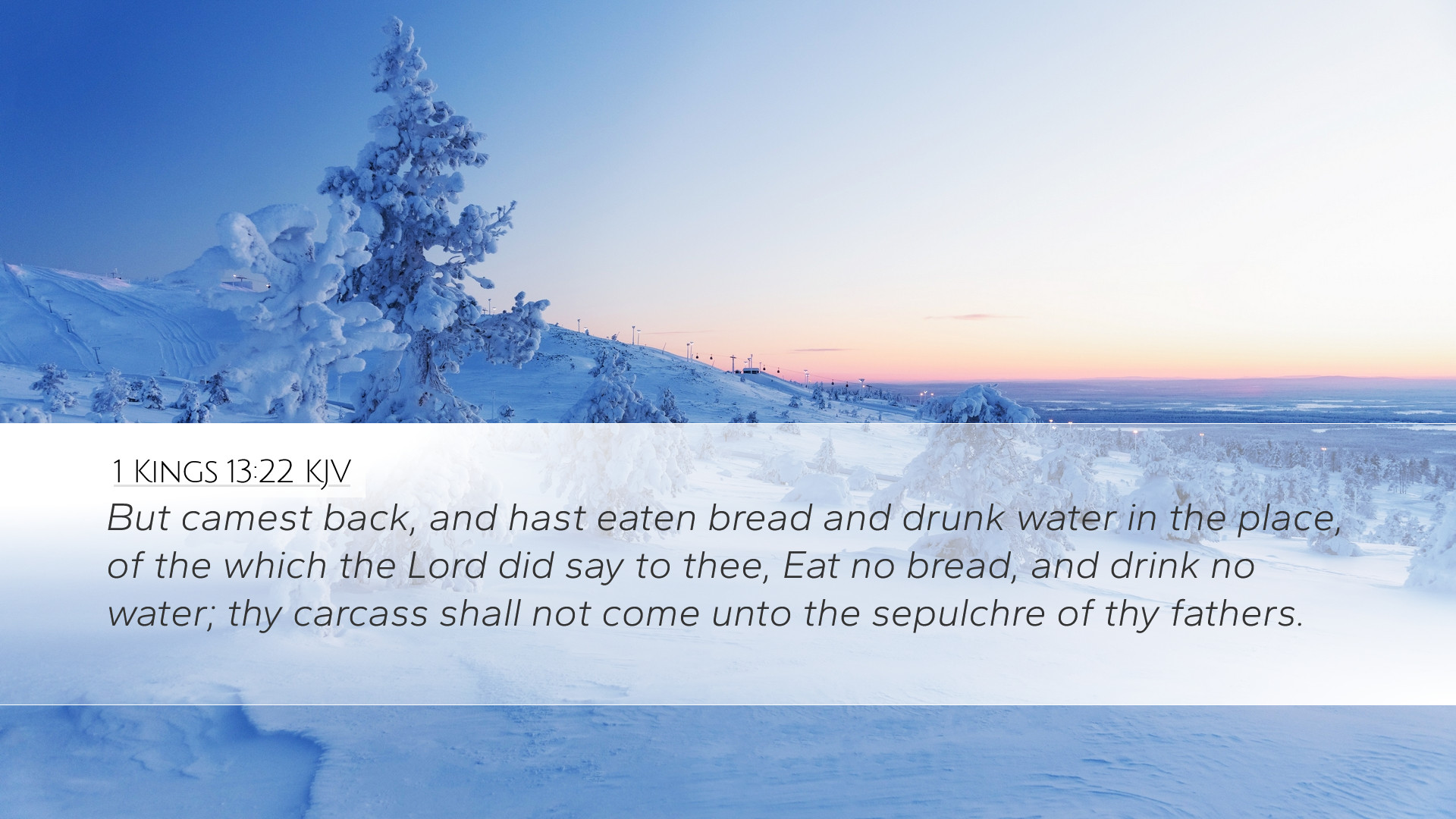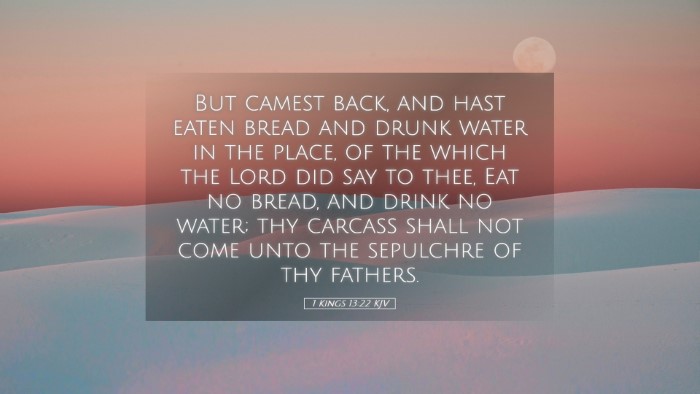Commentary on 1 Kings 13:22
The verse 1 Kings 13:22 states:
"But came back, and ate bread in the same house, and drank water; the word of the Lord came to him, saying, 'Forasmuch as thou hast disobeyed the mouth of the Lord, and hast not kept the commandment which the Lord thy God commanded thee.'"
Introduction
This passage presents a crucial moment in the narrative of the prophet who was sent by God to deliver a message to Jeroboam, the king of Israel. The context of the passage is essential for understanding the grave consequence of disobedience to divine commandments. By examining insights from notable public domain commentators, this commentary aims to illuminate the theological implications and moral lessons detailed in this verse.
Contextual Background
The events surrounding this verse are rooted in a specific historical and theological context. The prophecy delivered by an unnamed prophet is a testament to God's sovereignty and judgment over the northern kingdom of Israel, particularly in the face of Jeroboam's idolatry.
Matthew Henry's Insights
Matthew Henry notes the importance of obedience in the life of the believer. He emphasizes that the prophet’s initial adherence to God's command was commendable, yet his eventual disobedience highlights a common struggle faced by many believers.
-
Disobedience: Henry points out that the prophet was warned against eating bread or drinking water in Bethel, a clear command from God that he willfully disregarded.
-
Consequences of Disobedience: The repercussions of disobedience are stark in this narrative, signifying that even a small deviation from God's instructions can lead to severe outcomes.
Albert Barnes' Commentary
Albert Barnes elaborates on the nature of the warning delivered to the prophet and the implications of ignoring God's commands. He suggests that the act of eating and drinking was emblematic of fellowship and acceptance with the people in Bethel, which was in stark contrast to the prophet's mission.
-
Satanic Deception: Barnes alludes to the possibility that the old prophet who deceived the man of God may represent the contrasting influences that lead believers away from divine truth.
-
Illustration of the Human Condition: Barnes emphasizes that this narrative serves as a warning against the subtlety of temptation and the need for vigilance in spiritual matters.
Insights from Adam Clarke
Adam Clarke provides a detailed analysis of the text, particularly focusing on the implications of the disobedience. He remarks that the prophet, once a vessel for the Lord’s message, becomes a cautionary tale emphasizing the necessity of adhering strictly to divine commands.
-
God’s Sovereignty: Clarke underlines that God's ability to execute judgment is unfaltering, as evidenced by the fate that befalls the disobedient prophet.
-
Faithfulness in Service: Clarke advocates for the notion that true service to God must be accompanied by faithfulness to His directives, regardless of human reasoning or outside influences.
Theological Themes
The overarching theological themes in this passage speak to the nature of God’s covenant, obedience, and judgment. The experiences of the prophet reveal profound truths about God’s character and His expectations of those who are called to serve Him.
Obedience and Its Importance
The tragedy of the prophet's story illustrates that sincere intentions cannot substitute for obedience to divine commands. This theme resonates throughout the Scriptures and serves as a reminder of the priority God places on His word.
Judgment and Grace
The balance between God’s judgment and grace is prominent in this narrative. While the prophet faces severe consequences, there remains an underlying message of God’s desire for repentance and restoration, emphasizing that no one is beyond the reach of His mercy, should they turn back to His ways.
Practical Applications for Pastors and Theologians
For pastors, students, and theologians, this passage serves as a vital reminder of the importance of integrity and adherence to God's commands in ministry. Here are some practical applications:
-
Discernment: Pastors should be equipped with discernment to resist temptations that may lead to compromise in their teaching and leading.
-
Accountability: Establishing accountability structures within ministry can help safeguard against the influences that could lead to disobedience.
-
Teaching on Obedience: Teaching congregants about the significance of obedience to the word of God can foster a community that values spiritual integrity.
Conclusion
In conclusion, 1 Kings 13:22 serves as a poignant reminder of the importance of obedience to God’s commands and the consequences of straying from His directives. The insights from Matthew Henry, Albert Barnes, and Adam Clarke enrich our understanding of this passage, offering wisdom for the journey of faith. Future generations of believers and leaders are called to heed these warnings and strive for faithfulness in their relationship with God.


